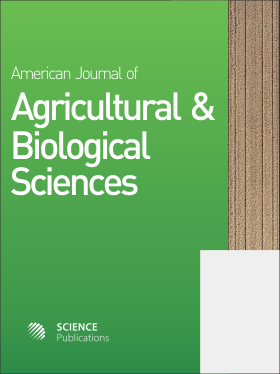Development of Microbial Inoculants and the Impact of Soil Application on Rice Seedlings Growth
- 1 Faculty Science and Technology, School of BioSciences and BioTechnology, University Kebangsaan Malaysia, 43600 UKM Bangi, Selangor, Malaysia
Abstract
Problem statement: The present study was undertaken to assess the Empty Fruit Bunches (EFB) as carrier of Biofertilizer and microbial inoculants interaction. A study in Malaysia had shown a strain of Trichoderma viride and Bacillus megaterium were isolated from the soil. Questions were raised whether the tow inoculants compatible to be mixed in same carrier? It is important to develop delivery system of the inoculants. The present study was undertaken to assess the Empty Fruit Bunches (EFB) as carrier of biofertilizers and microbial inoculants interaction and the impact on rice seedlings. Approach: Bacillus negaterium and Trichoderma viride were grown in their respective broth culture. Cells numbers in broth pr suspension were determined. EFB powder 200 g in polypropylene bags was sterilized. Inoculums from broth of suspension were added in EFB using sterilized syringe, moisture level in each packet was maintained by adding respective broth, 1 g was periodically withdraw from fomenters, soaked in 10 mL sterilized distal water, then serially diluted and plated out, the number of viable cells was expressed as cfu g-1 dry root. Twenty one-day-old rice seedlings of MR220 cultivar were grown under greenhouse conditions in autoclaved homogeneous soil, rice seedlings were treated with Trichoderma and Bacillus. Five replicates were used for each treatment. Rice seedlings height (cm), root length (cm), root numbers, root and shoot dray matter, parameters were measured during and after experiment. All data were analyzed at an alpha level of 0.05 or 0.10 using experimental design by completely randomized design model using the analysis of variance module (treatments × 3 R) all treatment means were separated using Fisher’s protected least significant difference (LSD) mean separation. Results: Trichoderma growth in carrier reduces Bacillus growth as interaction effect of both in same carrier which indicated that Bacillus unable to develop on multi-inoculants biofertilizers with Trichoderma. Inoculation of rice seedlings with Bacillus megaterium and Trichoderma viride produced maximum shoots and roots dry matter, increased significantly root length numbers and seedlings height comparing with control and same action of NPK fertilizers. Conclusion: The present study showed the possibility to develop the delivery system of biofertilizers which contained Bacillus and Trichoderma as mono inoculums not as multi-inoculants due to incompatible of both in same carrier. Bacillus and Trichoderma also showed appositive effect with rice seedlings.
DOI: https://doi.org/10.3844/ajabssp.2009.79.82

- 4,990 Views
- 5,937 Downloads
- 15 Citations
Download
Keywords
- Microbial inoculants
- carrier
- Bacillus
- Trichoderma
- empty fruit bunches
